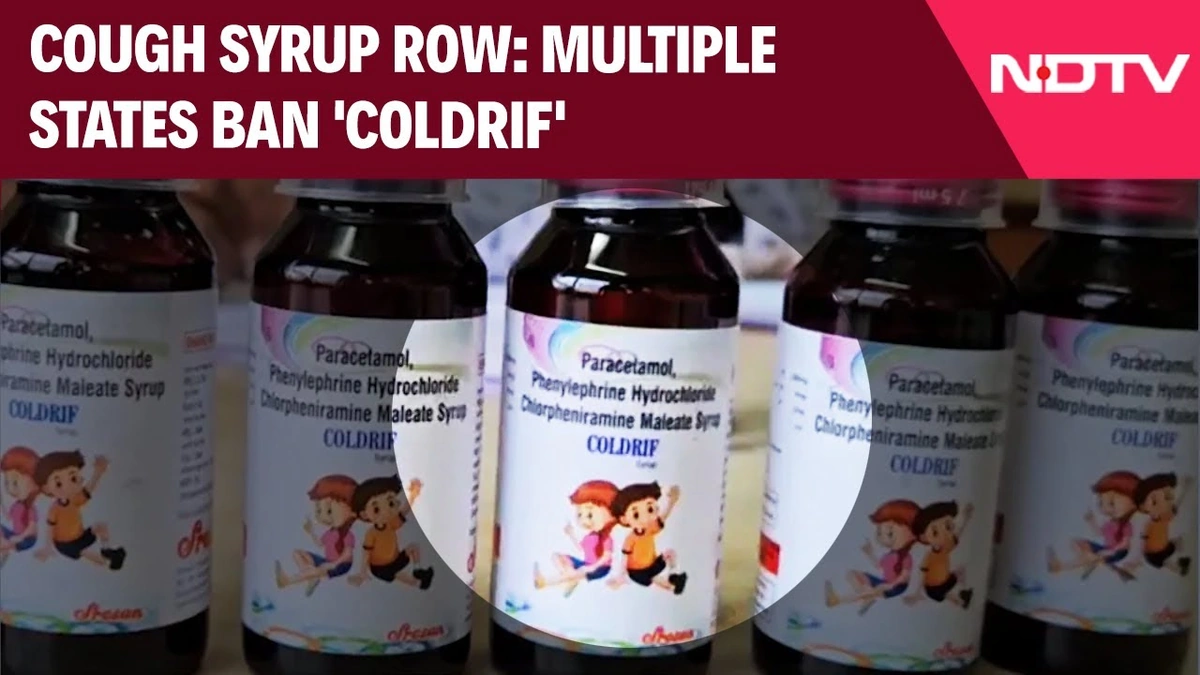Maharashtra Bans Coldrif Syrup Following Child Deaths in MP and Rajasthan
The news is out: Maharashtra has banned Coldrif syrup . But the headlines don’t tell the whole story. This isn’t just a regulatory decision; it’s a reflection of a much larger, and frankly, scarier problem. We need to talk about why this happened and what it means for parents across India.
Why Was Coldrif Syrup Banned? The Grim Reality

Let’s be blunt: child deaths are involved. Reports from Madhya Pradesh and Rajasthan linked the syrup to adverse reactions, raising serious red flags. Now, here’s the thing these incidents triggered investigations, and while the exact causes are still being determined, the Maharashtra FDA decided to err on the side of caution, issuing the Coldrif Syrup ban . It is not to scare you but these things happen, and we must address these issues so parents know what measures to take.
But it is more than that. The core issue often boils down to quality control in pharmaceutical manufacturing. Are proper protocols always followed? Are ingredients rigorously tested? These are the questions that keep me up at night, and honestly, should concern everyone.
The Regulatory Maze | What’s the DCGI Doing?
So, what role does the Drug Controller General of India (DCGI) play in all of this? Well, the DCGI is responsible for approving drugs for manufacture and sale in India. Think of them as the gatekeepers. But sometimes, even the best gatekeepers miss things. Read this article . The question then becomes: How can we strengthen the system to prevent future tragedies? Increased inspections, stricter penalties for violations, and greater transparency are all crucial pieces of the puzzle.
And it’s not just about the DCGI. State-level FDAs also have a massive role to play in monitoring drug quality and taking swift action when problems arise. The Maharashtra FDA’s response here shows they’re taking things seriously, but consistent vigilance across all states is essential.
For Parents | How to Stay Safe (Actionable Steps)
Okay, enough doom and gloom. Let’s get practical. What can you, as a parent, do to protect your children? First and foremost: consult your pediatrician. Self-medicating children is risky, and a doctor can recommend the safest and most appropriate treatment. This is a very important point, so you must understand this. Also, if you have any problems with your baby or child, don’t take things lightly. Go immediately to the doctor and tell them what problems your child is facing.
Secondly, always check the label. Look for the manufacturer’s name, expiry date, and any warning signs. If something seems off the packaging is damaged, the color is unusual err on the side of caution and discard it. Also, be aware of paracetamol and chlorpheniramine combinations in cough syrups that could be harmful.
Thirdly, be a savvy consumer. Do your research, read reviews, and ask other parents for their experiences. Information is power, especially when it comes to your child’s health.
Beyond Coldrif: The Bigger Picture of Drug Safety in India
The Coldrif Syrup ban is a symptom of a broader issue. India’s pharmaceutical industry is vast and complex, and maintaining consistent quality across the board is a huge challenge. Issues like spurious drugs, substandard manufacturing practices, and inadequate regulatory oversight need to be addressed head-on.
But how? Well, increased investment in regulatory infrastructure, stricter enforcement of existing laws, and public awareness campaigns are all vital. We also need to foster a culture of accountability within the pharmaceutical industry, where quality and safety are paramount.
This isn’t just about profits; it’s about protecting lives.
The Future of Pediatric Medications: What’s Next?
So, what does the future hold? I’m cautiously optimistic. The Maharashtra FDA’s action sends a strong message that regulators are paying attention and are willing to act decisively. But sustained effort is key. Stricter regulations, better enforcement, and greater transparency are essential to ensure that pediatric medications are safe and effective.
What fascinates me is the potential for technology to play a role. Imagine a system where consumers can scan a QR code on a medicine bottle to verify its authenticity and track its journey from the manufacturer to the pharmacy. This would empower consumers and create a more transparent and accountable system. I initially thought this was straightforward, but then I realized it’s complex, and we will get there someday.
Learn more about the Pharmaceutical industry .
The Coldrif Syrup ban is a wake-up call. It’s a reminder that we can never take drug safety for granted. As parents, we need to be vigilant, informed, and proactive. And as a society, we need to demand greater accountability from our regulators and pharmaceutical companies. Here is another trending story.
The health of our children depends on it.
FAQ
What exactly is Coldrif syrup used for?
Coldrif syrup is a combination medicine typically used to relieve common cold and allergy symptoms in children, such as runny nose, sneezing, and cough.
Are there alternative medications that are considered safer?
Consult your pediatrician for safer alternatives tailored to your child’s specific condition. Several other medications are available, but the choice depends on individual factors.
What should I do if I’ve already given my child Coldrif syrup?
Monitor your child for any unusual symptoms or adverse reactions. If you notice anything concerning, seek immediate medical attention.
Where can I find reliable information about drug safety in India?
The DCGI website ( cdsco.gov.in ) and state FDA websites are good sources. Always cross-reference information with your doctor.
How can I report a suspected adverse drug reaction?
You can report adverse drug reactions to the National Pharmacovigilance Programme of India (NPvPI). Your doctor can guide you through the reporting process.
Is the Coldrif syrup ban nationwide?
As of now, the ban is primarily in Maharashtra. However, other states may follow suit depending on their own investigations and risk assessments.













